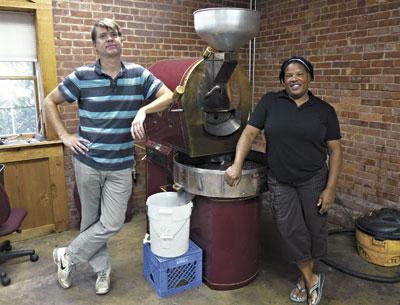Brewing for 20 Years

Java Nation in Bridgehampton, a coffee roastery that for 18 years had been in Sag Harbor, celebrated its 20th anniversary earlier this month.
More than two decades ago, Andres Bedini and his then girlfriend, Cheryl, had an idea while visiting her parents in Sag Harbor that led them to completely switch gears — she was in law school and he was working as a financial analyst — and start their own business. Living in California, where Mr. Bedini said the coffee movement really began, they drank a lot of coffee. “On one of our summer trips back here, we’re sitting in the Main Street Tavern in Sag Harbor, and we’re like, ‘Man, we’d love a cup of coffee right now. How could there be nowhere to get coffee?’ This was 1992 — there was nowhere to get coffee.” They said to each other, “ ‘What if we opened up a coffee shop?’ ”
At the time, Mr. Bedini said, they were thinking along the lines of a “funky coffee house” with poetry readings. On the advice of coffee shop owners on the West Coast, they decided to roast coffee so they could control the freshness and how dark they wanted the beans.
They weren’t exactly coffee connoisseurs yet. “We loved coffee, but we didn’t know anything — nothing. I’m still learning and it’s been 20 years,” Mr. Bedini said, adding that they immersed themselves in education over the years, from seminars on roasting and making espresso to traveling to coffee-growing regions, where they would see how coffee was picked, processed, and shipped.
Bridgehampton was actually supposed to be the roaster’s location to begin with. They had picked out a spot at the Bridgehampton Commons, only to be told after months of negotiations that they couldn’t locate there because of the competition it would pose for Rossano’s, which once occupied Panera Bread’s location. “I was crying in the kitchen, ‘I don’t want to practice law,’ ” Ms. Bedini recalled.
Mr. Bedini found a spot in the Shopping Cove in Sag Harbor, an alleyway off Main Street. They weren’t able to open until Labor Day weekend.
Back in 1994, roasteries were still somewhat of a new experience. “It was hard at first. No one was buying beans back then. There wasn’t a big brew-at-home market. It was something maybe you picked up at the market. People still wanted regular coffee,” he said. Starbucks had only just opened its first store in New York City. “Starbucks helped us a lot. It kind of converted people from the deli coffee to the specialty coffee.”
Java Nation serves up coffees by country of origin; you won’t find flavored coffees there. Instead, the Bedinis rotate different coffee beans based on the time of the year. “Coffee from Honduras is unbelievable right now. They’re having an incredible year. Colombia is having a big rebound year,” he said. “Brazil is having a bad year for them. They usually produce 60 million bags a year. This year it will be 50,” he said, referring to the drought that affected the crop and caused the price of coffee to double in 90 days over the winter.
Java Nation stayed open through the winters from the start, but didn’t get busy year round until 1998. “That was kind of the time when Sag Harbor really started booming,” Mr. Bedini said.
“It was a lot of hard work,” Ms. Bedini said. “It was exciting. We were always learning something new. We had mistakes and successes and we learned from those. That kept it stimulating.”
The store has always kept a narrow focus on being a roastery, as opposed to a coffee shop, and wholesale is a large part of their business, especially since moving to Bridgehampton. Java Nation’s coffee is sold at Provisions and served at the Altantic Golf Club, for example. The store also ships whole beans and ground coffee by mail.
The key to staying in business for two decades, Mr. Bedini said, is adapting. “That’s just life. It’s constantly throwing you curve balls. Change is constant,” he said.
The past few years have been especially difficult. In 2012, Java Nation had to leave its home of 18 years when the landlord rented the space to another coffee shop, angering longtime customers. In July of that year, it opened in its more industrial space on Maple Lane near the Bridgehampton train station.
The following year, Ms. Bedini’s father, Wesley Carrion, who was 90, died after his house caught fire in Sag Harbor Hills. Mr. Bedini said Mr. Carrion had always championed their business.
Java Nation’s reincarnation is showing promise. “It’s a lot busier than I thought. We’ve got a lot of new customers,” Mr. Bedini said, adding that he also has more wholesale customers now. Open 7:30 a.m. to 6 p.m. seven days a week, with little help other than in the summer, Mr. Bedini said the shop has taken new shape. Customers don’t linger like they used to in Sag Harbor, and the weekdays are busier than the weekends, the opposite of what was true in Sag Harbor.
Mr. Bedini said while he had thought about calling it quits, he is proud, but modest, about surviving two decades in business. “Your customers make you. If they still want you, it’s worth it,” he said.
